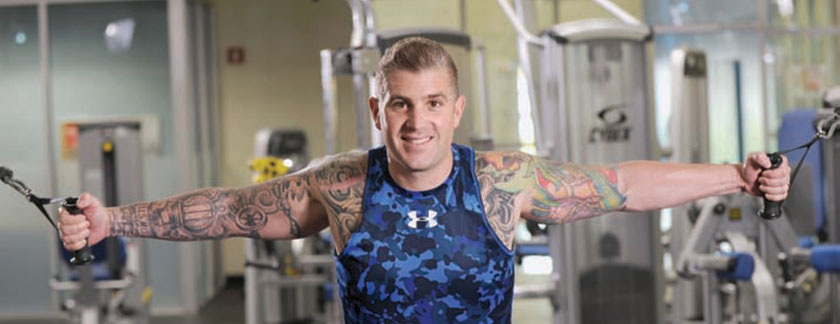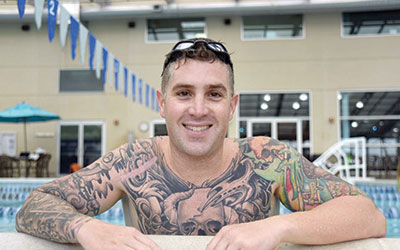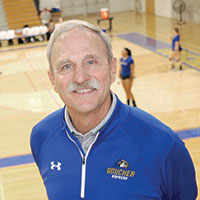Innovative Shoulder Treatments Reduce Pain, Improve Quality of Life

Many people think joint problems are limited to serious athletes or older adults. But when it comes to the shoulder, everyone is at risk.
“The unique and complex anatomy of the shoulder makes it the joint with the greatest range of motion but the least stability. Thus, it is more susceptible to strain, repetitive injuries, and aging than other joints,” says Anand Murthi, MD, chief of Shoulder and Elbow Surgery for MedStar Orthopaedic Institute, Central Maryland Region. “As such, shoulder problems should be cared for by experienced orthopaedic specialists.”
The specialists at MedStar Orthopaedic Institute have extensive knowledge and skill in treating a wide range of shoulder conditions, giving patients the best chance for a safe and healthy return to normal activities.
 In fact, MedStar Orthopaedic Institute’s shoulder and elbow team was the first in Maryland to earn the Joint Commission’s Advanced sub-specialty certification in shoulder and elbow surgery and ranks eighth in the country in terms of the number of shoulder replacements performed.
In fact, MedStar Orthopaedic Institute’s shoulder and elbow team was the first in Maryland to earn the Joint Commission’s Advanced sub-specialty certification in shoulder and elbow surgery and ranks eighth in the country in terms of the number of shoulder replacements performed.
“The goal with most shoulder injuries is to alleviate pain, strengthen muscles, and improve range of motion,” notes Dr. Murthi, who is fellowship trained in shoulder and elbow surgery. “The earlier we see you, the more conservative therapies, such as physical therapy and anti-inflammatory medications, may help.”
But sometimes, non-surgical treatment is not effective for relieving pain. Today, more and more people with chronic shoulder pain are finding relief in the form of joint replacement surgery.
Stemless Shoulder Replacement

By the time he was 33 years old, Nick Hozik’s body had already taken a beating. An avid athlete, he grew up playing football and baseball. Then he joined the Marines, serving for more than three years as an infantry rifleman and spending seven months in Iraq.
“Being in Iraq took its toll,” Hozik says. “We had to carry our gear everywhere.” Honorably discharged with the rank of sergeant in February of 2007, he then attended the Maryland State Police Academy. After graduation, he spent eight years with the Maryland State Police, first as a uniformed trooper and, after that, as an investigator with the Criminal Enforcement Division.
“During a team training session, I injured my back and my shoulder,” he explains. “Being a former Marine, I tried to tough it out. But over time, I had more and more pain and started losing my range of motion, which was impacting my pistol qualifications.”
Hozik made an appointment with Dr. Murthi. “Nick had severe arthritis but he was so young that we were hesitant to totally replace his shoulder. We tried a conservative approach, but it wasn’t enough,” says Dr. Murthi. Unable to return to work, he was forced to retire from the Maryland State Police.
“I really wanted to get back to being more active and doing the things I love,” Hozik notes. “So I made another appointment with Dr. Murthi to go over my options. He told me about stemless shoulder replacement surgery, an alternative to traditional shoulder replacement surgery that had just been approved, and I agreed to give it a try.”
Stemless shoulder replacement is just that—stemless. “In the traditional joint replacement surgery, a ‘stem’ is surgically implanted into the humerus bone. In the stemless procedure, only the ball of the shoulder and a very small segment of the humerus bone are replaced,” explains Dr. Murthi, one of the first surgeons in the country to perform the procedure. “For younger patients, the stemless replacement is a valuable way to preserve as much of the bone as possible, which can be beneficial down the road should they need an additional surgery.”
The stemless procedure is also less invasive, so there is less blood loss and patients generally recover faster—often going home the same day.
Hozik had surgery in November of 2015 and now, at the age of 35, is back to lifting weights, running, swimming two miles per week, and working as security director for a large commercial real estate company. “I feel fortunate to have had this option and to have been cared for by the specialists at MedStar Orthopaedic Institute,” Hozik says. “They even made sure to line up the artwork in the tattoos I had gotten as a Marine when they closed my incision after surgery.”
Outpatient Shoulder Replacement

Geoff Miller is another patient who has benefited from the expertise of the shoulder specialists at MedStar Orthopaedic Institute. Director of Athletics at Goucher College for 24 years, the 63-year- old had developed osteoarthritis, after “years of playing sports where you collided with other people,” Miller says. He had both hips replaced in the mid-2000s, then started experiencing pain and range of motion issues in both shoulders a couple of years ago.
He was referred to Jason Stein, MD, also fellowship trained in shoulder and elbow surgery, who replaced Miller’s left shoulder during an inpatient procedure in November of 2016. When he went back to have his right shoulder replaced in June of 2017, he was offered the option of an outpatient procedure— enabling him to go home just a few hours after surgery.
According to Dr. Stein, patients are the major benefactors when it comes to having a total shoulder replacement done as an outpatient. “Returning home the same day as surgery, as compared to spending several days in the hospital after an inpatient procedure, is more convenient and less stressful for patients,” he says. “Patients who have their surgery performed as an outpatient experience numerous short-term benefits without sacrificing any long-term results.”
Miller agrees. “I woke up in recovery after surgery and was back in the comfort of my own home by dinner,” he says. “I could control how often I iced, which made the swelling go down faster, and I was able to manage the amount of pain medication I took myself, which was less than I would have gotten as an inpatient. That was great because I am very sensitive to drugs. I had minimal pain and my recovery was much quicker.” Today, Miller is back at work cheering on the Goucher Gophers without pain.
“As specialists in shoulder replacements, we perform far more of these procedures each year than most orthopaedic surgeons do in a lifetime,” Dr. Stein notes. “Performing a total shoulder replacement on an outpatient basis makes for a much better patient experience and is a testament to our expertise and surgical skills.”
Dr. Murthi adds, “Most shoulder replacements in the U.S. are done by orthopaedic surgeons who are good surgeons, but not shoulder specialists. Seeing a specialist equates to better results, lower complication rates, and makes a big difference in terms of the quality of care a patient can expect to receive.”
To learn more about the shoulder specialists at MedStar Orthopaedic Institute or to schedule an appointment, visit MedStarOrtho.org or call 877-34-ORTHO (877-346-7846).
This article appeared in the winter 2018 issue of Destination: Good Health. Read more articles from this issue.
Location Information
MedStar Union Memorial Hospital
3333 North Calvert Street, Suite 400
Baltimore, MD 21218
410-554-2832
Related Services
- Shoulder and Elbow Service
- Reverse Total Shoulder Replacement (Outpatient Shoulder Replacement, Stemless Shoulder Replacement)
- Total Shoulder Replacement









